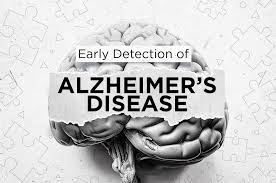Early Alzheimer’s Detection
Science & Technology SciencePosted by NewAdmin on 2025-02-11 08:47:41 |
Share: Facebook | Twitter | Whatsapp | Linkedin Visits: 25

Early detection of Alzheimer’s disease is crucial for effective intervention, and recent advancements have made promising progress in this area. Researchers have developed a blood test that can detect toxic amyloid-beta (Aβ) oligomers—small protein aggregates that contribute to Alzheimer’s disease—long before symptoms appear. These toxic proteins start forming over a decade before cognitive decline becomes evident, making early detection critical.
A research team funded by the National Institutes of Health (NIH) developed the Soluble Oligomer Binding Assay (SOBA), which detects Aβ oligomers in blood samples. The method relies on synthetic molecules that specifically bind to the toxic oligomers, distinguishing them from harmless protein forms. In testing, SOBA identified Aβ oligomers in nearly all Alzheimer’s patients and even detected the proteins in some cognitively healthy individuals who later developed mild cognitive impairment. This suggests the test could predict Alzheimer’s years before traditional symptoms appear.
Beyond Alzheimer’s, SOBA has potential applications for detecting other neurodegenerative diseases like Parkinson’s and Lewy body dementia, as these conditions also involve toxic protein oligomers. Researchers believe this method could not only help with early diagnosis but also serve as a tool for tracking disease progression and evaluating treatment efficacy. If widely adopted, blood tests like SOBA could revolutionize Alzheimer’s diagnostics, leading to earlier interventions and potentially slowing disease progression before significant brain damage occurs.
Search
Categories
Recent News
- Chennai's Development Under the Lens: Minister's Inspection Tour
- Bank Fraud Unveiled: PNB Manager's Golden Scheme Exposed
- Assam CM Vows Legal Action: Land Grab Claims Refuted
- India-Canada Relations Warm Up: A Strategic Alliance in the Making?
- Indian Cricket Prodigy Shines in U19 World Cup Semi-Final
- The Fine Line Between Acclaim and Scrutiny in Football Management
- Prostate Cancer Awareness: A Hospital's Initiative for Early Detection
- India's Data Revolution: AI Infrastructure and Job Creation
Popular News
- Navigating IPO Market Dynamics Amid Volatility and Regulatory Changes
- Massive Worldwide Microsoft Outage Disrupts Multiple Sectors
- Panjapur Bus Stand to Reshape TNSTC Routes
- తెలుగుదేశం పార్టీ - పేదరికాన్ని నిర్మూలించడంలో వాగ్దానం
- Universities Embrace Remote Learning Technologies Amidst Ongoing Pandemic